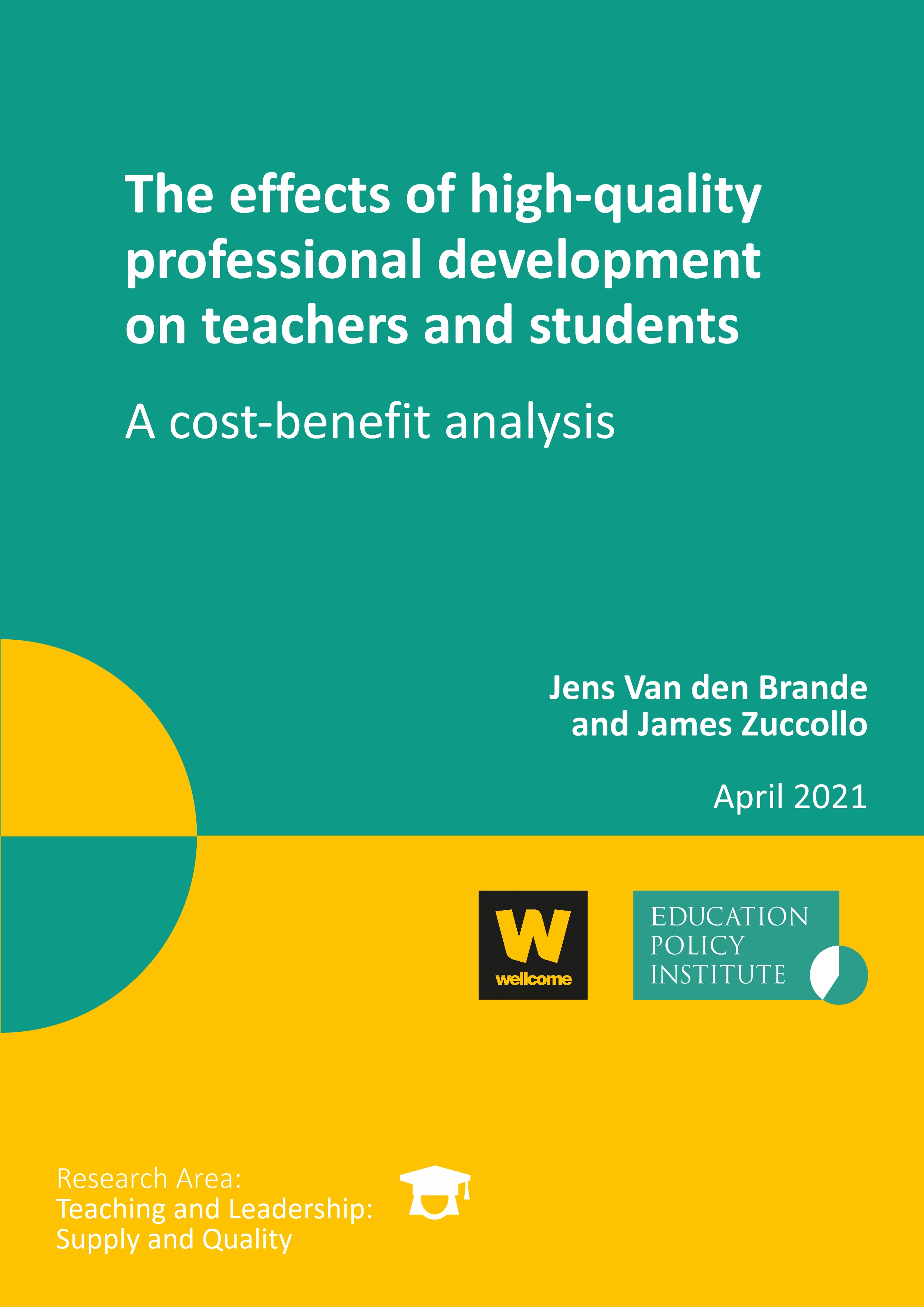Providing teachers with a right to high-quality training and development would boost pupil attainment and earnings, and may tackle retention problems in the profession, a cost-benefit analysis study from the Education Policy Institute (EPI) commissioned by Wellcome has shown.
While continuing professional development (CPD) can be important to ensuring teacher quality and progression, there is currently no formal entitlement to high quality support offered by the government. Teachers in England currently participate in less CPD than their international counterparts, while the quality of CPD programmes on offer often fails to meet government standards.
The new report finds that a well-implemented policy of 35 hours a year of high quality CPD for teachers would lead to significant benefits for pupils, including an extra two-thirds of a GCSE grade – improving their lifetime earnings by over £6,000.
The EPI cost-benefit analysis demonstrates that in total, a CPD entitlement programme costing £4bn would generate a net societal benefit of around £61bn through higher earnings – a benefit 19 times the cost. However, these considerable gains are dependent on the policy being rolled-out effectively on a national scale.
In the immediate term, a policy of CPD entitlement could also significantly improve retention, leading to up to 12,000 extra teachers remaining in the profession a year. A retention boost of this scale would help to ease the Department for Education’s recurring recruitment problems. Typically, it falls short by around 3,000 teachers a year.
The government is currently exploring plans for improving the CPD offer for teachers as part of its long-term plan to tackle learning loss experienced by pupils as a result of the pandemic.
Education Secretary Gavin Williamson announced this month that training and development for teachers would be “central” to the government’s wider education recovery plan, which is currently being led by the Education Recovery Commissioner, Sir Kevan Collins.
As the government formulates this long-term programme to support both pupils and teachers, today’s study provides timely evidence of the high returns generated from well-implemented, high quality teacher CPD.
You can read the full report here.

Key findings
Professional development can be crucial for teachers, but the quality of programmes is mixed and England lags behind other countries
- Secondary school teachers in England spend on average just 43 hours a year on CPD – well below the OECD average of 62 hours a year.
- Despite teachers in England undertaking less CPD than their international counterparts, they still do more than the proposed entitlement of 35 hours each year. However, it is likely that the majority of CPD currently being provided in England does not meet the criteria for high-quality CPD. A recent Wellcome CPD pilot showed that just 11% of CPD taken up by teachers met the government’s quality criteria.
Giving teachers a formal right to high-quality CPD would bring significant returns to both pupils and teachers
- Introducing a formal entitlement for teachers in England to 35 hours of high quality CPD a year would generate significant benefits for pupils over time in the way of education and employment outcomes.
- If a pupil started school when the entitlement policy for teachers was introduced, by GCSE level it would lead to an extra two-thirds of a grade – which in turn translates to extra lifetime earnings of over £6,000 per pupil.
- Overall, taking earnings into account, a programme of 35 hours a year of high-quality CPD for teachers costing £4bn would generate a net societal benefit of around £61bn through increased earnings – a benefit 19 times the cost.
- In the short term, a policy of CPD entitlement could also significantly improve retention, leading to up to an estimated 12,000 extra teachers remaining in the profession a year.
- This retention boost has the potential to reduce a significant proportion of the 40,000 teachers who typically leave the profession every year. A retention boost of this kind would also help the Department for Education meet its teacher recruitment targets, which it usually falls short of by around 3,000 a year.
- There is some evidence suggesting that improving access to high-quality CPD for teachers could improve both teacher and pupil wellbeing – but this is difficult to quantify, and more research is required to establish this.
But to deliver these benefits, a CPD entitlement policy for teachers would have to be rolled-out effectively by the government
- The benefits of an entitlement policy are however highly contingent on the policy being implemented effectively by the government. To realise the full extent of these benefits, a CPD entitlement policy at a national level would have to be implemented as effectively as existing, smaller-scale CPD programmes.
- Any reduction in effectiveness compared to those programmes would dramatically reduce the potential benefits of the policy.
- The most important element of implementation of the policy is the quality of CPD seen by teachers, rather than the quantity. Identifying high quality CPD is crucial for effective implementation. Better government data on teacher CPD is required to monitor the impact of any CPD policy changes – current data for England does not indicate the proportion of CPD which qualifies as high quality.
This report is funded by Wellcome.
Wellcome supports science to solve the urgent health challenges facing everyone. We support discovery research into life, health and wellbeing, and we’re taking on three worldwide health challenges: mental health, infectious disease and climate. We are a politically and financially independent foundation.
We believe that science should be exciting for young people, giving them skills and opportunities to improve their futures. We want to make sure that all young people in the UK have access to a world-class science education.
Our work in education focuses on:
- Teacher expertise
- Primary science
- Science education research
- Informal science learning
- Practical science
- Young peoples’ views on science
Research and evidence sits at the heart of our work. By providing compelling educational research, we hope to influence education policy and make sure that evidence is used to support change and improve teaching and learning.



